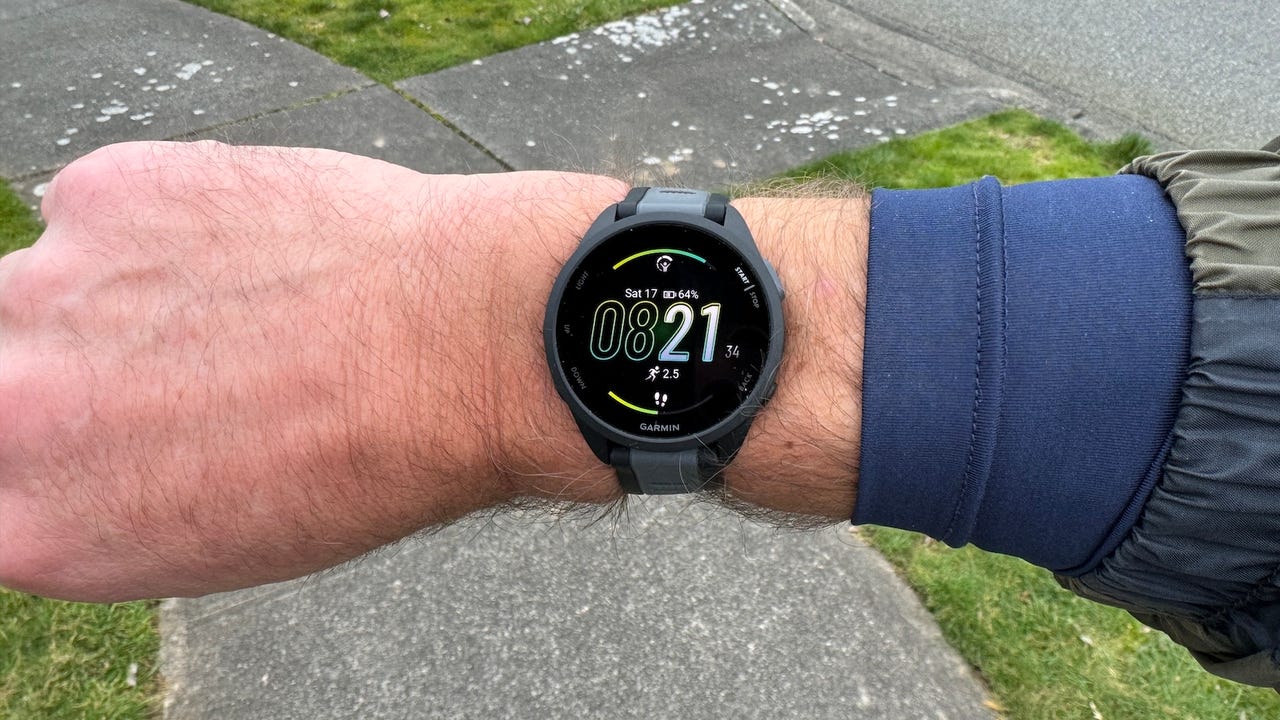
































Garmin continues to modernize its various watch series with lovely and vibrant display options, this time putting an AMOLED panel on one of its entry-level running watches, theGarmin Forerunner 165 and 165 Music .
With it, one of the company's most compact watches, ideal for those with smaller wrists or who prefer something lighter weight, now has an even better display to help visualize your fitness tracking, metrics, and more
Also: I hiked with Garmin's 'unlimited battery' GPS tracker and it made life so much easier
The Forerunner 165 launches at$249.99, and the 165 Music is$50 more at$299.99. I've spent the past week using both, and here are my biggest takeaways, including which of the two you should buy.
View at GarminTo navigate the Forerunner 165, both a touchscreen interface and traditional five-button controls are provided. All of the customizations I've seen on previous Garmin watches, including the more expensive ones, are also available, so it's rather straightforward to set up workouts and optimize your training plans.
Of all the sports and fitness plans, the Forerunner 165 is most focused on supporting runners, with features like adaptive training plans, wrist-based running power and dynamics tracking, training effect, course support, and more. 25 activity profiles are also provided for activities like swimming, pickleball, yoga, and pilates, but I couldn't find anything for more specific tasks like indoor rowing, which is currently my primary exercise. In that case, I wasn't able to track my workouts with the watch.
A feature I really enjoyed using was "Morning report," which provided a summary of my previous day and evening's tracking, along with the training plan for the day of. Sleep monitoring with sleep scores and nap detection were also welcome features to have. Metrics such as training effect and recovery time will help you understand the complete picture of your health and wellness, and they're things I like to keep in mind as I plan my activities during the day.
Garmin advertises up to 19 hours of GPS tracking, and in the couple of times I ran, I was able to get a similar estimate. In watch mode, you may see up to 11 days of battery life, but enabling the always-on display will likely cut that number in half.
The Forerunner 165 Music model I tested supports offline music storage from Spotify, Deezer, and Amazon Music, so you can stream to a Bluetooth headset with no phone connection required. Audio prompts from guided workouts or performance alerts are also exclusive to the 165 Music model, so it's worth keeping in mind. I often play Amazon Music through mySuunto bone conduction headset during workouts and have found the audio support invaluable.
Also: My favorite bone conduction headphones have 3 invaluable safety features
On both models, women's health tracking features, including menstrual cycle and pregnancy tracking, are available. While the Forerunner 165 is too small for my large wrists, it's great to see more variety and options for those who want a smaller watch with similar functionalities as Garmin's more expensive wearables.
Lastly, I've been testing the Forerunner 165 with the redesigned Garmin Connect app and the software looks great, with custom glance widgets, training plan status up front and visible, and key data present on the home screen.
Garmin has a broad range of wearables fit for every customer. TheForerunner 165 is the latest on that list, with a focus on runners and users with smaller wrist sizes. Garmin's vast ecosystem and all of its key health and wellness features are supported on both variants, but that's not even the best part. The$249 starting price is competitive, especially considering all that Garmin has to offer in its smartphone app and ecosystem.
 Hot Tags :
Tech
Wearables
Hot Tags :
Tech
Wearables